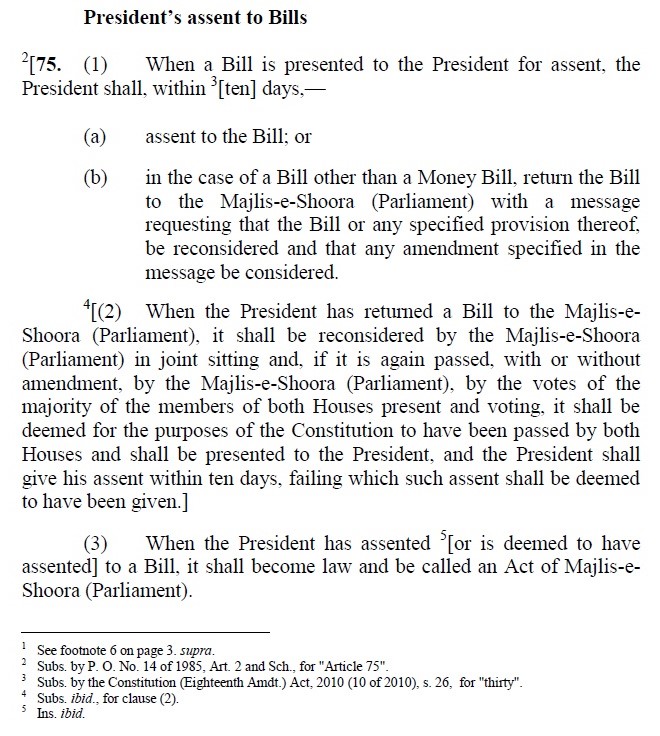Can a law which has not been given assent by president as required under art.75 of the Constitution of Pakistan be "deemed" to have become law after passage of 10 days during which time the president was supposed to either give assent or decline & send back the bill?
a thread...
a thread...
https://twitter.com/BBCUrdu/status/1693250040033071272
Art.75 of the constitution provides two possible rounds for legislative process once both houses of parliament have passed a bill in separate sittings in normal course. In the 1st round under article 70, the bill passed by parliament in separate sittings goes to the president
2/
2/
...who may (a) give assent to the bill, (b) or decline with a general or specific recommendation for reconsideration by parliament of the version of law it passed earlier (this is supposed to be done in 10 days). The first round attains finality if president gives assent.
3/
3/
Second round of legislative process (see article 72) is triggered if president declines to give assent to the bill already passed in separate sittings of both houses of parliament with a general or specific recommendation for reconsideration of the law previously passed.
4/
4/
In the second round, parliament must reconsider the bill in a mandatory joint sitting. Once the law is passed with/without amendment(s) by a majority of both houses in a joint sitting, the president must give assent to it within 10 days,
5/
5/
or the bill thus passed by parliament will be “deemed” to have been given assent by president. The constitution doesn’t provide for a deeming situation in the first round as described above. In the first round what is essential and more important is assent or decline.
6/
6/
The text of art.75(1) suggests that for a bill to become law of the land as a result of the attempt in the first round, it is more important for it to achieve assent by president, than its return to parliament within a period of 10 days which pales into lesser significance
7/
7/

if not complete insignificance, esp bec there’s no deemed result in the first round as a consequence of president's failure to act as expressly provided in second limb of art.75(2) for the second round which is triggered due to decline or failure to act on part of president
8/
8/
i.e. once the law is passed by parliament in joint sitting, with or without amend(s), it must necessarily result in becoming an enforceable law regardless of what may be done or not by president. This consequence is not envisaged in the 1st round as encapsulated in art.75(1).
9/
9/
*caution: in the very first tweet words "Can a law..." should be read as "Can a bill..."
• • •
Missing some Tweet in this thread? You can try to
force a refresh

 Read on Twitter
Read on Twitter




